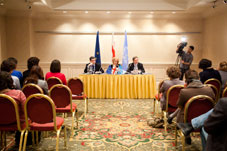
Media Monitoring for presidential election coverage kicks off
By Salome Modebadze
Wednesday, May 1
A new round of media monitoring was officially launched at the Tbilisi Marriott Hotel on April 30. The pre-election media monitoring implemented within the framework of the project: "Professional Media for Elections" supported by the European Union (EU) and the United Nations Development Programme (UNDP), aims at contributing to a transparent, objective and balanced environment during the elections.
This is the third year that quantitative and qualitative monitoring of Georgian media has taken place.
While the country prepares for the presidential elections this year, from May till December, four Georgian civil society organizations – the Caucasus Research Resource Centre (CRRC), Internews – Georgia, International Society for Fair Elections and Democracy (ISFED) and the media Civic Development Institute will monitor national and local television, radio, newspapers and online media.
Head of the EU delegation to Georgian Philip Dimitrov said we cannot talk about the best results because here the effect is not in the end but it is the process.
He also said the impact of the monitoring is not in putting the results into small squares and giving it names; the impact is in the process of transparency, and transparency is nothing without the feedback that comes in a form of “public feeling.”
The ambassador thinks it is important to continue the process because elections come and go, but the direction of the process in a democratic country is permanent. He said this is why reading periodically who has acted how and which medium has gone astray or not is something that really helps.
Inita Paulovica, deputy Head of UNDP in Georgia, told The Messenger that the goal and initiative of the project started when they saw the media were not unbiased and independent and people were limited in the information they received.
“So we wanted to show by this media monitoring to the media themselves and also to the public how different media react to different events,” Paulovica said, stressing that the methodology used for analyzing the media during the pre-election period is common for many countries throughout the world.
According to Paulovica, it helped the media to better perform as they realized that “someone” was watching what they were doing through comparing them.
She said this project also touched on media independence and media transparency. She said at the moment when you have the full information of who owns media, and their goals and when people have access to different media, then you can talk about media independence through access to information.
Paulovica said the aim of the process is to provide information about the media landscape, what the media is talking about, and how biased or unbiased these stories are, thus a lot of discussions of independence and professionalism of media have come out. She said that people have also started to listen and read about what the media is talking about because “not always are the messages straightforward and not always can you understand from news what it is about.”
She said with their experience gained during the three-year monitoring, these civil society organizations can be good advisers not only to media to become really more independent, professional and transparent and also for politicians to see how the media could or could not be used as a tool for political battles.
Mariam Kobaladze, a Research Associate from CRRC, said the previous monitoring has revealed that the media environment was polarized, certain TV companies were biased, the same events were covered from absolutely different angles so that sometimes it was even hard for the viewers to received truthful information, while after the elections the situation changed. Kobaladze said the media outlets were interested in every new report and tried to perform in a better way, consider remarks and have balanced stories.
Key findings of the media monitoring will be regularly posted to the website: www.mediamonitor.ge and the Facebook page www.facebook.com/mediamonitor


